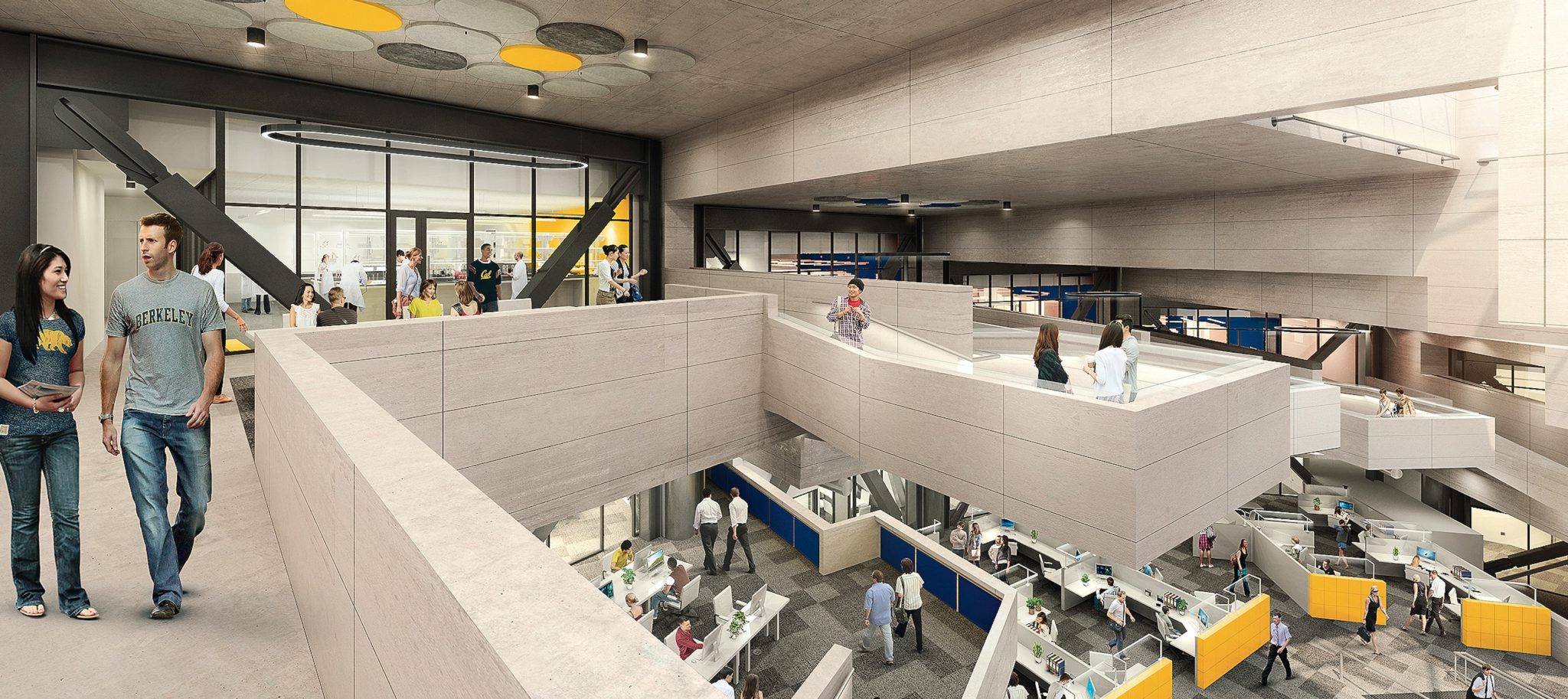With its fanned and cantilevered wings, brutalist bulk, and rich history, the former Berkeley Art Museum on Bancroft has long been a notable campus landmark. Now, after an extensive face-lift and seismic upgrades, the stately edifice (since 2011, called Woo Hon Fai Hall) has a new purpose: It is home to the Bakar BioEnginuity Hub, an initiative to support biotech research and start-ups led by executive director Amy Herr, Berkeley professor of bioengineering.
“I can tell you, almost without exception, when I’m bringing companies in through the building, the first word out of their mouth is, ‘Wow!’” said Gino Segrè, Ph.D. ’00.
Segrè is managing director for Bakar Labs, an incubator at the BioEnginuity Hub. Bakar Labs will host budding companies focused on everything from climate change solutions to radical new cancer therapies. Having opened its doors in November, it will rent space in the Hub to as many as 80 start-ups.
By backing the Hub, Berkeley is making a bet that life sciences will overtake IT in terms of shaping the future.
“In some ways, what has defined the way society has evolved over the last 20 years is information technology,” said Rich Lyons, chief innovation and entrepreneurship officer at the University. “The next 20 years are going to be a couple of decades of life science–driven change.”
Lyons says Berkeley is looking to capitalize on recent successes in the life sciences—most notably Jennifer Doudna’s Nobel Prize for CRISPR gene-editing. “Everybody’s looking at Berkeley right now, and not just because of Jennifer’s work,” he said, adding that the University’s ambitions are to be the world leader in life sciences. “We aspire to be singular. We aspire to be incomparable in this area.”
One of the companies slated to get a boost at Bakar is BluumBio, a Berkeley-originated project that is developing plants that can break down pollutants and toxins in the environment. The company grew out of research that Katherine French first conducted as a postdoc in Norman Terry’s lab in the Department of Plant and Microbial Biology, where French and colleagues engineered bacteria and plants to “eat” petroleum—as much as 50 percent in 60 days. Since then, BluumBio has expanded its toolbox to include products that degrade PCBs, PFAS, and microplastics, and that hyperaccumulate heavy metals.
BluumBio is hardly the only start-up in the Bakar Hub with Berkeley roots. Catena, a company co-founded by Marco Lobba, Ph.D. ’21, based on research he did in Jennifer Doudna’s and Matt Francis’s labs, is focused on sewing disparate molecules together to create powerful new vaccines and drugs to treat cancer and autoimmune disorders. Another, Axent, is a woman-led company focused on developing stem cell therapies. It was co-founded by Riya Muckom, Ph.D. ’18.
Segrè says Bakar Labs is about combining Berkeley’s dominance in STEM fields with a growing interest in entrepreneurship. “I like to describe this as a perfect storm, where there are people who are interested in starting companies, there are people who have incredible scientific training, and then, of course, there’s an entire community that says, ‘Hey, why can’t we harness this incredible talent to really translate benefits, bring them out, and benefit the global community.’”
Segrè envisions companies staying in the Hub for two to three years before becoming established enough to move out, ideally remaining in the East Bay and helping to cement the area’s identity as a biotech capital.
Segrè is also part of QB3, a.k.a., the California Institute for Quantitative Biosciences, a state-funded initiative that exists on the UC campuses at Berkeley, San Francisco, and Santa Cruz. QB3 has partnered with the Hub to run the incubator.
To be sure, the layers of organization and acronyms involved are a little dizzying—UC, QB3, BBH, Bakar Labs—and raise an obvious question: To what extent is the Bakar BioEnginuity Hub even part of UC Berkeley?
“It is 100 percent under the umbrella of Berkeley,” said Lyons. But, it “has some characteristics that give it a little bit of an outside quality.” One of those characteristics is how the intellectual property will be handled. While work done in Berkeley’s on-campus laboratories is owned by University of California, work that emerges from Bakar Labs will be the companies’ own intellectual property. Any excess revenue that may be earned through Bakar Labs will go toward supporting programs on campus.
This is just the latest in a long line of often controversial public-private partnerships that the University has entered into over the past several years, including high-profile deals with pharmaceutical giant Novartis and BP, the oil company formerly known as British Petroleum. Critics of these deals, including many faculty, worried about academic integrity and the propriety of arrangements that blurred the lines between corporations and the University.
“My judgment? Blurring boundaries is a good thing,” says Lyons, who insists that a great university needs more flexibility today to fulfill its mission. “This is the modern research university.”




















